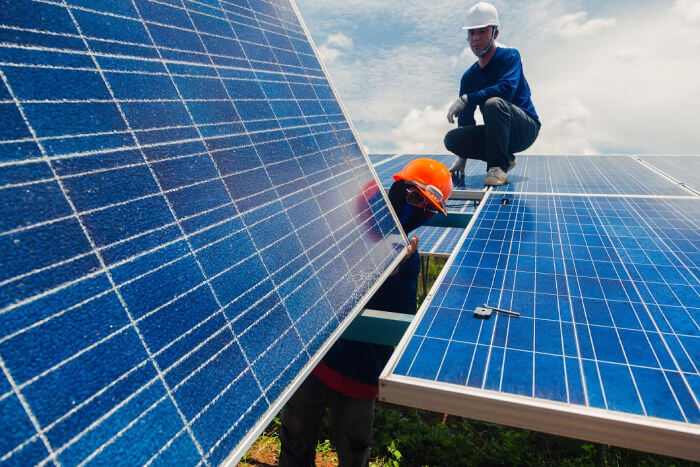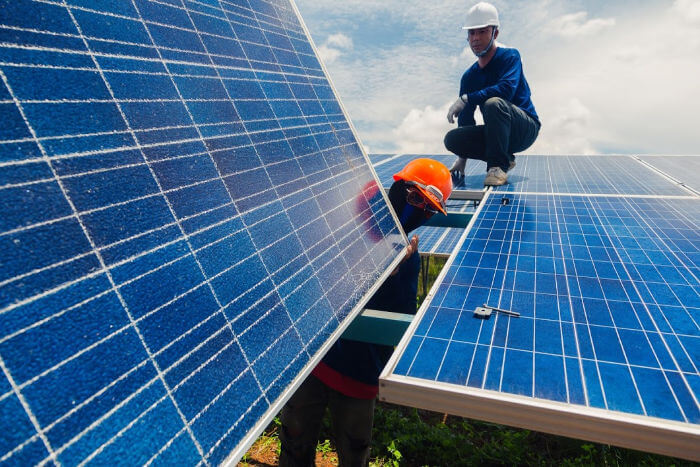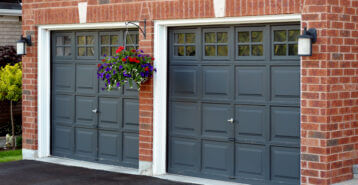Are you doing a solar project?
Modernize can pair you with three to four pros in your area, so you can compare options and save time and money.
It’s very exciting that you have set a course to power your home through solar energy and in doing so will be increasingly saving on your utility bills. With a budget in hand and its particulars as ironed out as possible, you should have an idea by now about whether your project will require financing. If you do go the route of solar financing, it is best to have an understanding of the many options you can take.
Two options you might come across, solar leases and power purchase agreements (PPAs), bear some similarities that are worth noting, as well as differences you should be aware of. Consult the experienced contractor working your project for a reliable source of institutional knowledge about financing solar home improvement projects and anecdotal examples of the various choices you could make, based on what they have seen other homeowners do (complete with benefits and risks).
Generally speaking, these two options greatly minimize any upfront costs to you in the initial installation of a solar panel system. They both assist you in lowering your monthly utility bills. They reduce (or eliminate) the risk of installing or improving your home as the final owner of the unit is a third company that is liable for any damage it incurs or any damage it causes (like an accident that knicks your outside wall during the installation itself, for example). And they both result in increased property value as your home, whether through a solar lease, PPA, or otherwise, is now powered through solar energy. An important note about both solar leases and PPAs is that both disqualify you from the many local, regional, and national financial incentives offers to homeowners for improving their homes in eco-friendly ways like you’re doing with solar panels.
Below, we’ll lay out the foundation of leases and PPAs to prepare you for the choices that lay ahead and to inform the conversations you’ll be having with professionals.

What is a Solar Lease?
Simply put, a solar lease —like any lease— means you don’t own the solar panels you’re installing to power your home. Instead, you’re leasing them from a company that will own them and to whom you’ll pay a monthly fee.
Often, to stay competitive, a solar leasing company will offer you a deal by which you owe nothing upfront and promises you that despite your fee, you’ll be saving money in the long term considering the power you’re creating and your savings on your utility bill. While this may be so, you’re also not gaining equity in the solar panel system that’s now part of your home since someone else owns it. According to the Federal Trade Commission, the contractual length of leases like this could extend to 20 years, so it’s no light decision and you should be sure to run some ideas by your contractor, who should be experienced enough to notice red flags or, more optimistically, spot a good deal.
“Your contract may allow your monthly payment to increase over time,” the FTC adds, and while it notes that “the leasing company will probably be responsible for system maintenance,” that’s one of the details in the agreement you want to be sure you fully comprehend, along with general maintenance and warranty obligations.
And while your lease payment to the company that owns the solar panel system might be minimal, remember to calculate that total cost against your total savings.
Find the Right Contractor for Your Solar Project
Whether you’re ready to begin your project now or need some expert advice, our network of contractors are here to help. With a few simple questions, we’ll find the best local professionals for you
“Your savings are much more limited with a solar lease, because you have to pay for the lease the entire time the panels produce electricity for you,” Yahoo Finance advises. “And if you want to move, you’re going to have to find a buyer for your home who’s willing to take over the solar lease payments.”
Explore Financing OptionsWhat is a Power Purchase Agreement?
While a bit more complex than a solar lease, a PPA is similar in that it takes the onus of purchasing and maintaining a solar panel system off of your shoulders and leaving it to a developer or company.
Here’s how it works:
- A company designs, installs, and maintains your home’s solar panel system.
- The solar panels power your home but you pay a fixed fee to the owning company for the energy as it owns the generated power.
- Your rate is such that it’s lower than what you would be paying a utility company.
- The company is fully responsible for the efficient operation and timely maintenance of the solar panel system.
“This lower electricity price serves to offset the customer’s purchase of electricity from the grid,” explains the Solar Energy Industries Association, “while the developer receives the income from these sales of electricity as well as any tax credits and other incentives generated from the system.”
PPAs usually last anywhere between a decade to 25 or 30 years, just like solar leases. And when they end, your options include an extension, you can have the solar panel system removed, or you can negotiate to buy the system from the developer.
There are a few notable concerns to keep in mind if you’re considering a PPA. First, according to the Environmental Protection Agency, you’ll be facing “more complex negotiations and potentially higher transaction costs than buying PV system outright.” Also, if your system doesn’t cover all of the energy you need in a single month, you’ll be paying your utility as well as the company that owns your solar panel system.
Whatever your plans or aspirations are, the best move is to not go at it alone. Find a contractor you trust and in whom you feel you can confide. The more upfront you are about what you want to do and your financial limits, the better a contractor will be able to hone in on the best type of budget to build for your solar panel installation. It might not result in the pie-in-the-sky solar panel home improvement you dreamed of, but it will result in the best value you’ll get for the money you’re able to invest.
Find the Right Contractor for Your Solar Project
Whether you’re ready to begin your project now or need some expert advice, our network of contractors are here to help. With a few simple questions, we’ll find the best local professionals for you
Reviews from Real Homeowners
Welcome to Homeowner Resources! We are the Modernize blog. Modernize pairs more than 3 million homeowners a year with pre-vetted contractors in their area. This blog started because we believe homeowners should know everything about their homes, from how their HVAC works to which front door colors they might love. On Homeowner Resources, you can find information on every part of your home, right down to how you can negotiate with contractors to get the best price. Here's more about the blog.
Need a contractor? Learn more about how Modernize finds the right pro for you.




